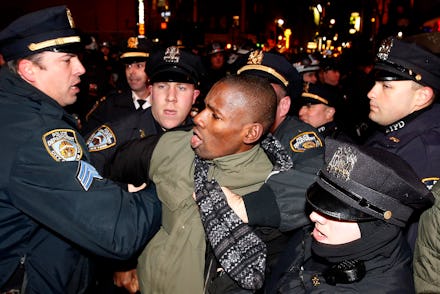England Has Avoided Eric Garners and Michael Browns by Doing What the U.S. Won't

The grand jury rulings in the Michael Brown and Eric Garner cases have sparked outrage across the U.S. as protests have broken out across the country.
But while many activists and protesters have rightfully focused on racial disparities in the criminal justice system, the rulings reveal another problem: Grand juries may be an inherently flawed way of holding police officers accountable.
The U.S. may want to take a lesson from the U.K., where the grand jury originated — and get rid of the practice entirely.
The origins of the grand jury: The system, created to check rulers' power, dates back to medieval England. Men were selected to keep an eye on their neighborhoods and report any criminal activity that they witnessed, PRI reports. In the 16th century, this practice turned into the modern grand jury system, with a secret panel of 12 citizens "listening to a prosecutor's evidence and deciding whether to indict." Most of Britain's colonies – including the U.S., Canada, New Zealand, and Australia – began to use the system.
But the U.S. stands out from the other colonies in one major way: It's the only one that still uses grand juries.
The U.K. abolished its system decades ago, in 1933, because they came to the conclusion that grand juries don't have the balanced outcome and procedures that other trial systems afford citizens. As legal writer Joshua Rozenberg so aptly explained to PRI, "[Grand juries] are said to be 'putty in the hands of the prosecutor.' In other words, the prosecutor really tells them what he or she wants and they will go along with it."
The prosecutor has a huge pull over how the grand jury views the case. After all, it's the prosecutor who presents evidence to the jury. Essentially, prosecutors can impress upon the jury the image of the case they want to convey. There is no chance for cross-examination, and it is entirely up to the prosecutor as to which victims appear and in which order.
Moreover, the Christian Science Monitor reports "prosecutors rarely bring cases they don't think they can win, which means that the grand jury process is often a formality."
According to the Monitor, grand juries nearly always return an indictment — except when cases involve a police officer. Although there is no clear count on just how many people police officers kill in a year (the Killed by Police Facebook page reports about 1,000 people in 2014), a study says just four officers are indicted each year on average.
So why is it so rare for an officer to be indicted? The first big reason likely has to do with the amount of trust handed over to police when they receive their guns. Police are technically obligated to adhere to a certain set of standards, which can make their side of the story appear more believable.
But that caveat aside, the rarity of an officer being indicted also has to do with the way a grand jury looks into a felony and, more specifically, police-related deaths. The legal system tends to err on the side of the police in general. Police officers are convicted on felony charges much less often than the average civilian — 33% of police facing charges are convicted, as opposed to 68% of civilians.
Typically, grand jury hearings are quick and simple. Evidence is presented to show probable cause. The defendant rarely testifies. The jury then votes for an indictment. For cases in which police are involved, the trials drag out for much longer. Evidence is presented, but cross-examinations are absent. The prosecutor controls which witnesses appear. And there's often an inherent conflict of interest, as Mic's Greg Krieg explains: "When prosecutors are tasked with investigating and charging police officers, they're being asked to punish members of an organization who are tightly intertwined with their own operations — a big obstacle to ensuring that justice is done."
So now what? The flawed proceedings of these grand jury hearings have raised doubts as to why these cases aren't heard at trial and decided upon in court.
Some, including elected officials and former police officers, have suggested that a special prosecutor or even an attorney general should investigate cases in which police are involved. Another option is to make the grand jury proceedings that go on behind closed doors transparent to the public eye.
Although lawmakers across the country have yet to settle on an appropriate fix, the fact that these points are being raised is a step in the right direction. Cases like the deaths of Michael Brown and Eric Garner should not have been needed to wake up America to a reality that the U.K. saw 81 years ago.
In the U.K., people are an estimated "100 times less likely to be shot by a police officer than Americans," according to the Economist, which likely has something to do with its better system of accountability (and also that British police officers don't typically carry firearms). While Brown and Garner's deaths have caused so much outrage and agony, maybe they can lead to some good, and the U.S. will make a change to its justice system that's nearly a century overdue.